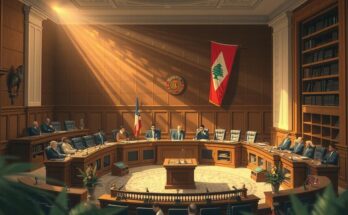Recent clashes between Syria and Lebanon have sparked heightened tensions involving Hezbollah, leading Lebanese President Joseph Aoun to order military responses. The actions from Hezbollah, including accusations of abducting Syrian soldiers, reflect the broader threats to Lebanon’s sovereignty. As regional dynamics shift, calls for accountability and disarmament of Hezbollah are becoming increasingly urgent to prevent national destabilization and potential civil conflict.
The recent skirmishes on the Syria-Lebanon border highlighted a shift in military engagement dynamics. Unlike previous conflicts, where the Lebanese Armed Forces refrained from directly targeting Syrian positions, the recent clashes, which resulted in a ceasefire, saw direct engagements spurred by Hezbollah’s actions. These tensions were notably different due to an accusation from Syria towards Hezbollah regarding the abduction and killing of three Syrian soldiers near Homs, escalating the conflict.
The historical context reveals that during Bashar Assad’s tenure, the Lebanese military primarily contained spillover effects but seldom engaged Syrian forces, focusing instead on securing local villages. However, the current situation reflects a decisive shift in policy with Lebanese President Joseph Aoun ordering military action against hostile fire. This illustrates a commitment to Lebanon’s sovereignty that must also address internal accountability against Hezbollah’s excesses.
President Aoun’s orders underscore the essential role of the Lebanese Armed Forces in maintaining territorial integrity. Even in scenarios where Syrian soldiers might have crossed into Lebanon, Beirut must maintain control over the situation, demonstrating professionalism to avoid escalation. Aoun’s declaration of having “one sovereign voice” echoes the pressing need to contain Hezbollah’s unchecked influence, which not only stems from south but is also fomenting disruptions from the north.
The animosity toward Hezbollah from the new Syrian leadership suggests a significant domestic challenge for the group. Hezbollah’s notorious history of crimes during the Syrian civil war undermines its standing, especially as recent intelligence reports corroborate its involvement in severe human rights violations. Thus, despite a ceasefire, tensions remain escalated, not least due to ongoing Israeli military actions against Hezbollah forces.
While Hezbollah’s military capabilities are reportedly diminishing, its potential for inflicting harm on Lebanon endures. This presents a considerable risk to national stability as unchecked power could catalyze foreign interference, prompting local entities to seek external support against Hezbollah. Such developments could ignite another civil war, jeopardizing Lebanon’s future.
For Lebanon to avert catastrophe, President Aoun must garner national support to decisively confront Hezbollah, moving towards disarmament and accountability. The lessons from Lebanon’s past engagements illustrate the necessity for a system that holds accountable those who have committed treason and violence. Emphasizing the establishment of a singular, legitimate army will fortify Lebanon’s sovereignty, deterring future encroachments.
In conclusion, the evolving conflict dynamics on the Lebanon-Syria border necessitate a robust response from Lebanon’s leadership. Maintaining sovereignty and curtailing Hezbollah’s unchecked power are paramount to preventing national destabilization. President Aoun’s decisive actions could potentially lay the groundwork for a more cohesive political system, ensuring accountability for past transgressions. The unity of Lebanon’s military under one banner is vital to securing lasting peace and stability.
Original Source: www.arabnews.pk




